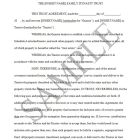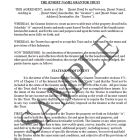Generation-Skipping Transfer (GST) Tax: 22 Practical Clauses (34 Pages)
In stock
SKU
GST
$199.00
The window to take advantage of generous GST planning opportunities and to repair GST planning mistakes might be closing. Political risk suggests at least the possibility that the current generous GST exclusion may be reduced substantially. This is a critical time to discuss GST planning with clients.
These 22 Practical Clauses Address:
1: Crucial GST exclusion planning issues involving lifetime transfers to be made as well as those made in prior years for which corrections and revisions are still possible and
2: Inserting the proper language in estate planning documents to be certain that each individual takes the maximum desired advantage of the GST exclusion, especially taking into account that the exclusion is not portable.
The window to take advantage of generous GST planning opportunities and to repair GST planning mistakes might be closing. Political risk suggests at least the possibility that the current generous GST exclusion may be reduced substantially. This is a critical time to discuss GST planning with clients.
The generation-skipping transfer tax (GST) exclusion is set at $12.06 million per person for 2022, and indexed for inflation going forward. The law allowing this exclusion (the 2017 Tax Cuts and Jobs Act) is set to sunset after 2025, when the exclusion reverts to approximately $6 million per person. The GST exclusion is NOT portable. It is a “use it or lose it” opportunity for each person.
These 22 Practical Clauses Address:
1: Crucial GST exclusion planning issues involving lifetime transfers to be made as well as those made in prior years for which corrections and revisions are still possible and
2: Inserting the proper language in estate planning documents to be certain that each individual takes the maximum desired advantage of the GST exclusion, especially taking into account that the exclusion is not portable.
PART I: CLAUSES ADDRESSING LIFETIME TRANSFER ISSUES
Clause 1: Form of Notice of Timely GST Allocation
Clause 2: Form of Notice of Late GST Allocation
Clause 3: Form of Protective Notice of Automatic Allocation – to be Certain GST Exclusion is Allocated to Transfer – GST Trust
Clause 4: Form for Notice of Election to Elect Out of Automatic Deemed GST Exclusion Allocation to GST Trust
Clause 5: Form to Include with Form 709 to Report GST Allocation at the Close of the ETIP (Estate Tax Inclusion Period)
Clause 6: Statement to Include on Form 709 to Report Cash Gift to a Trust Containing Crummey Withdrawal Powers
Clause 7: Statement to Include on Form 709 to Report Multi-Year Gift to Section 529 Plan for Benefit of Grandchild
PART II: CLAUSES TO BE INCLUDED IN ESTATE PLANNING DOCUMENTS
Clause 8: GST Marital and Family Trust Provisions, Including Reverse QTIP Language, and Administrative Provisions
Clause 9: GST General Administrative Provisions
Clause 10: Address the Generation-Shipping Transfer Tax that may be Payable as the Result of a Taxable Termination
Clause 11: Allow for the Creation of a General Power of Appointment for Skip Persons
Clause 12: GST Savings Clause #1 – Give Non-Skip Person Broad General Power of Appointment to Avoid Inadvertent GST Transfer
Clause 13: GST Savings Clause #2 – Give Non-Skip Person More Restrictive General Power of Appointment to Avoid Inadvertent GST Transfer
Clause 14: GST Power to Split (Sever) Trusts in the Trustee’s Discretion
Clause 15: Form to Sever a Single Marital Trust into Separate Exempt and Non-Exempt Trusts
Clause 16: Include this GST Power in a Trust to Coordinate with the Grantor’s Will
Clause 17: Provision to Protect Reverse QTIP Clause
Clause 18: Definition of “Available Generation-Skipping Tax Exclusion”
Clause 19: Suggested Order of Allocation of GST Exclusion by Executor over Settlor’s Trust Agreement
Clause 20: Series of GST Trustee Powers
PART III: ATTACHMENT TO FORM 706 REGARDING SEVERED TRUST AND REVERSE QTIP ELECTION
Clause 21: Form to Attach to Schedule R, Line 9 of Form 706 to Address Severed Trust and Reverse QTIP Election
PART IV: DOCUMENT TO FILE TO AVOID FILING A REQUEST FOR A PRIVATE LETTER RULING AND TO OBTAIN RELIEF FOR A LATE-FILED REVERSE QTIP ELECTION
Clause 22: Form to Avoid the Requirement of a Private Letter Ruling and Obtain Relief for a Late Filed Reverse QTIP Election
Author:
Steven G. Siegel is president of The Siegel Group, which provides consulting services to attorneys, accountants, business owners, family offices and financial planners. Based in Morristown, New Jersey, the Group provides services throughout the United States. Mr. Siegel is the author of many books, including: The Grantor Trust Answer Book (2012 and 2013 CCH); CPA’s Guide to Financial and Estate Planning (AICPA 2012); and Federal Fiduciary Income Taxation (Foxmoor 2012). In conjunction with numerous tax planning lectures he has delivered for the National Law Foundation, Mr. Siegel has prepared extensive lecture materials on the following subjects: Planning for An Aging Population; Business Entities: Start to Finish; Preparing the Audit-Proof Federal Estate Tax Return; Business Acquisitions: Representing Buyers and Sellers in the Sale of a Business; Dynasty Trusts; Planning with Intentionally-Defective Grantor Trusts, Introduction to Estate Planning; Intermediate-Sized Estate Planning; Social Security, Medicare and Medicaid: Explanation and Planning Strategies; Subchapter S Corporations: Using Trusts as Shareholders; Divorce and Separation: Important Tax Planning Issues; The Portability Election; Generation-Skipping Transfer Tax: A Comprehensive Review; and many other titles. Mr. Siegel has delivered hundreds of lectures to thousands of attendees in live venues and via webinars throughout the United States on tax, business and estate planning topics on behalf of numerous organizations, including The Heckerling Institute on Tax Planning, CCH, National Law Foundation, AICPA, Western CPE, the National Society of Accountants, the National Tax Institute, Cohn-Reznick, Professional Education Systems, Inc., Foxmoor Education, many State Accounting Societies and Estate Planning Councils as well as on behalf of private companies. He is presently serving as an adjunct professor of law in the Graduate Tax Program (LLM) of the University of Alabama, and has served as an adjunct professor of law at Seton Hall and Rutgers University law schools. Mr. Siegel holds a bachelor’s degree from Georgetown University (magna cum laude, phi beta kappa), a juris doctor from Harvard Law School and an LLM in taxation from New York University Law School.
Author:
Steven G. Siegel is president of The Siegel Group, which provides consulting services to attorneys, accountants, business owners, family offices and financial planners. Based in Morristown, New Jersey, the Group provides services throughout the United States. Mr. Siegel is the author of many books, including: The Grantor Trust Answer Book (2012 and 2013 CCH); CPA’s Guide to Financial and Estate Planning (AICPA 2012); and Federal Fiduciary Income Taxation (Foxmoor 2012). In conjunction with numerous tax planning lectures he has delivered for the National Law Foundation, Mr. Siegel has prepared extensive lecture materials on the following subjects: Planning for An Aging Population; Business Entities: Start to Finish; Preparing the Audit-Proof Federal Estate Tax Return; Business Acquisitions: Representing Buyers and Sellers in the Sale of a Business; Dynasty Trusts; Planning with Intentionally-Defective Grantor Trusts, Introduction to Estate Planning; Intermediate-Sized Estate Planning; Social Security, Medicare and Medicaid: Explanation and Planning Strategies; Subchapter S Corporations: Using Trusts as Shareholders; Divorce and Separation: Important Tax Planning Issues; The Portability Election; Generation-Skipping Transfer Tax: A Comprehensive Review; and many other titles. Mr. Siegel has delivered hundreds of lectures to thousands of attendees in live venues and via webinars throughout the United States on tax, business and estate planning topics on behalf of numerous organizations, including The Heckerling Institute on Tax Planning, CCH, National Law Foundation, AICPA, Western CPE, the National Society of Accountants, the National Tax Institute, Cohn-Reznick, Professional Education Systems, Inc., Foxmoor Education, many State Accounting Societies and Estate Planning Councils as well as on behalf of private companies. He is presently serving as an adjunct professor of law in the Graduate Tax Program (LLM) of the University of Alabama, and has served as an adjunct professor of law at Seton Hall and Rutgers University law schools. Mr. Siegel holds a bachelor’s degree from Georgetown University (magna cum laude, phi beta kappa), a juris doctor from Harvard Law School and an LLM in taxation from New York University Law School.
We found other products you might like!
-
 3 Irrevocable Life Insurance Trusts (75 Pages)Special Price $199.00 Regular Price $237.00
3 Irrevocable Life Insurance Trusts (75 Pages)Special Price $199.00 Regular Price $237.00 -
 Dynasty Trust (34 Pages)Special Price $129.00 Regular Price $149.00
Dynasty Trust (34 Pages)Special Price $129.00 Regular Price $149.00


